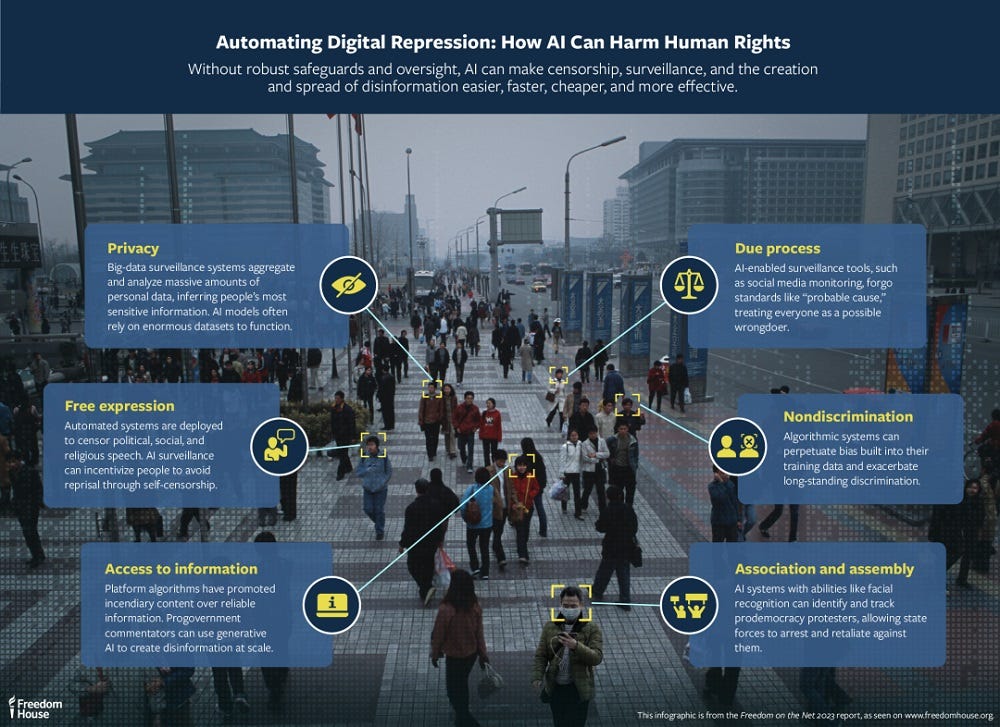How AI can harm human rights
Why AI helps online censorship. Mexico is seeking to regulate AI. AI's momentum. Interview with DeepMind's CEO.
The latest news and trends in the Latin American AI startup scene.
Share your stories to ai@contxto.com.
_
The Repressive Power of Artificial Intelligence
Global internet freedom declined for the 13th consecutive year, with Iran experiencing the worst decline. Governments are increasingly using AI to reinforce censorship and generate disinformation. AI technology allows for more precise and subtle forms of online censorship, while AI-generated images, audio, and text make it easier to distort the truth.
Surveillance systems and facial scans are used to identify and track prodemocracy protesters. In 55 out of 70 countries, people faced legal repercussions for expressing themselves online, and in 41 countries, people were physically assaulted or killed for their online commentary.
Democratic policymakers must establish strong human rights-based standards for AI tools to protect internet freedom. AI can be both harmful and protective, depending on how it is regulated. Iran, China, and Myanmar were highlighted as countries with severe restrictions on internet freedom. (Freedom House).
The Artificiality of Alignment
The article discusses the current discourse surrounding AI existential risk and the focus on AI alignment research. It argues that the current trajectory of AI alignment research seems more concerned with building profitable products rather than addressing the potential real-world harms caused by AI.
Companies like OpenAI and Anthropic, while conducting research, also prioritize building products and generating revenue. This financial side quest complicates the mission of understanding how to build aligned AI systems and raises questions about whether current approaches to alignment are effective in preventing catastrophic outcomes.
The article also examines the technical challenges of AI alignment and highlights the concept of intent alignment as a key aspect of addressing the issue. (The Gradient)
Quick News
Mexican startup iVentas.com grows 200% in one year
Mexican startup iVentas.com has experienced significant growth, with a 200% increase in revenues in just one year.
The platform helps businesses boost sales through WhatsApp and has conducted transactions with over 350 clients. It has expanded its operations to four Latin American countries and plans to reach the Latin community in the United States and Brazil.
iVentas.com integrates Artificial Intelligence to provide advanced technology to businesses, including multi-user access, chatbot configuration, and sales opportunity identification. (Contxto)
10 LATAM startups to receive USD$50,000 from Credicorp Group
Grupo Credicorp, a leading financial holding company in Latin America, has announced the 10 startups selected for its 'Future of Financial Services' accelerator program.
Each startup will receive an investment of $50,000, with the potential for an additional $150,000 upon program completion. The selected startups are from Peru, Colombia, and Chile and have demonstrated the potential to transform financial services through innovative technologies.
The startups cover a range of financial solutions, including cryptographic payments, financial inclusion for mobility workers, digitizing savings and credit associations, and AI-driven platforms for forecasting and alternative financing. (Contxto)
Six latin american startups selected for Techstars Miami
Techstars Miami Powered by J.P. Morgan has announced the 12 startups that will participate in their Fall Class 2023 program.
The selected startups include Casalist, CodeGPT, Fuddis, Gabu, ILUMA, Devpass, accelEQ, Cloudoor, FortyGuard, Question Base, Rhetora, and Smartsy.
The program aims to accelerate the process of founders achieving product-market fit. Techstars Miami is already accepting applications for their spring session in 2024. (Contxto)
AVIRU wins the eAwards Peru 2023
The Virtual Road Assistant (AVIRU) has won the eAwards Peru 2023 for its innovative device that provides real-time voice alerts to heavy vehicle drivers, reducing speeding on dangerous curves by up to 90%.
AVIRU received a $10,000 prize and the opportunity to compete in the international final of the Global eAwards 2023 in Madrid.
The NTT DATA INNOVATION WEEK will also take place, providing tools, methodologies, and connections for the winning entrepreneurs. Peru aims to join the select group of unicorns in Latin America, as no Peruvian startup has reached a valuation of USD$1 billion. (Contxto)
Videsk: only Latin American startup in Founder Residency program
Chilean startup Videsk has been selected to participate in the Founder Residency program, run by The Roux Institute.
The program offers Videsk co-founders the opportunity to learn and collaborate with industry leaders, including Google, and establish strategic connections. Videsk aims to use this opportunity to penetrate the US market and strengthen its presence in Latin America.
The program provides non-dilutable equity-free funding of USD$25,000, mentorship, research opportunities, and a community of fellow entrepreneurs. (Contxto)
Incode, mexican unicorn, opens office in Brazil
Incode, a startup specializing in AI-powered identity verification, has announced the opening of its office in Brazil.
The company aims to become a leading digital identity solutions provider in the country and plans to double its market share next year. Incode's flagship product, the Incode Omni platform, promises safer and faster transactions, reducing identity verification fraud by up to 99%.
The company achieved unicorn status in 2021 and has experienced significant growth. Incode will seek partnerships with major companies in sectors such as banking, fintech, tourism, airlines, and entertainment. This move represents a milestone for the digital identity market in Brazil and takes advantage of the country's growth potential in the technology sector. (Contxto)
ApproPay started operations in Colombia with Google
ApproPay, in collaboration with Google, has launched in Colombia to revolutionize the country's financial landscape.
Developed by Ecollect and Approbe, ApproPay offers a digital payment solution that operates independently of traditional banks and includes a "Buy now, pay later" option.
ApproPay aims to provide a simpler digital experience and is working with Google to implement artificial intelligence for a more empathetic financial experience. The launch event brought together investors and leaders from various sectors, showcasing hope for a promising future.. (Contxto)
Venture Fund Has USD$1 Billion Ready for Latin America Tech Rebound
Latin America's largest venture capital firm, Kaszek Ventures, has raised USD$1 billion in funding and is waiting for new investment opportunities.
After a record year of funding for Latin American tech companies in 2021, founders are now realizing the need to balance growth and profitability. Kaszek has already increased its deal flow this year, investing in seven companies.
The firm expects 2024 to be even better. Funding for tech startups has decreased globally, but the squeeze has been more severe in Latin America. Kaszek raised USD$540 million for early-stage investments and USD$435 million for late-stage growth companies earlier this year. The firm has raised a total of USD$3 billion and has backed over 120 companies. (BNN Bloomberg)
Travel Optimization Through Data-Driven Tech is 'Inevitable'
Zamna aims to revolutionize the travel and aviation industry through digital intelligence. Their innovative approach allows travelers to complete essential tasks before arriving at the airport, reducing queues and manual processes.
Zamna's technology securely connects and validates passenger data, providing a personalized and efficient experience across different airlines. They use blockchain technology to store data in a decentralized and anonymized manner, ensuring data protection.
Zamna's solutions have led to significant cost savings for airlines, improved operational efficiency, and a smoother experience for passengers. They plan to expand in Mexico and Latin America in 2024, targeting international airlines and seeking local investment and network partners to support their growth. (Mexico Business News)
ChatGPT Enhances Cybercrime Strategies and Effectiveness
The rapid development of AI models, such as ChatGPT, is being exploited by cybercriminals to enhance their attacks.
This has led to an urgent need for regulations to mitigate the risks associated with AI in cybersecurity. Advanced detection measures and ethical AI use are crucial in preventing malicious activity. ChatGPT is being used for phishing scams, malware distribution, disseminating misinformation, and defamation.
In Mexico, a senator has proposed a legal framework to control the responsible integration of AI, although some critics argue that it needs further analysis. (Mexico Business News)
AI Education
Open-source ML observability course
The course covers topics such as exploratory data analysis, model evaluation, continuous production monitoring, and debugging. It also includes modules on testing data quality, detecting data and prediction drift, monitoring changes in text data, and debugging model performance decay.
The course is free and consists of six modules with on-demand videos and practical code examples. Participants can earn a certificate upon completion. The course starts on October 16, 2023, and course materials will be available even after the course ends. Additionally, participants have the opportunity to contribute to the open-source project Evidently for Hacktoberfest and receive prizes from DigitalOcean.
TorchGeo
TorchGeo is a PyTorch domain library that provides datasets, samplers, transforms, and pre-trained models specifically for geospatial data. Its goal is to simplify working with geospatial data for both machine learning and remote sensing experts.
The library includes geospatial datasets and samplers for working with different types of remote sensing data. It also includes benchmark datasets for tasks like image classification, regression, and semantic segmentation.
Building an API in the cloud in fewer than 200 lines of code
This blog post explains how to create a scalable cloud-based API using Google Cloud, Terraform, and FastAPI in less than 200 lines of code. The API can serve up data or prediction requests efficiently.
The post provides step-by-step instructions on setting up the necessary components, including creating a Google Cloud project, installing the required tools, and configuring Terraform. It also demonstrates how to use FastAPI to create the API endpoint and handle data validation. The final result is a fully functional API that can be deployed on the cloud.
Food for Thought
Why now?
The article explores the question of why AI advancements are booming at the moment. It suggests that two key factors, data and hardware, have led to significant progress in AI. The availability of large datasets, made possible by the internet, has allowed machine learning models to be trained more effectively.
Additionally, the development of GPUs (graphics processing units) has enabled parallel processing, making training models faster and more efficient. However, the article argues that the real breakthrough came with the introduction of the Transformer architecture, which revolutionized language model training.
With Transformers, relationships between words can be learned simultaneously, overcoming previous limitations in speed and memory. The combination of data, hardware, and the Transformer architecture has led to the rapid advancements in AI that we are currently witnessing. (Artificial Ignorance)
DeepMind cofounder is tired of ‘knee-jerk bad takes’ about AI
In a recent interview with VentureBeat, Mustafa Suleyman, co-founder of DeepMind and CEO of Inflection AI, recently discussed his concerns and perspectives on AI risks. While he acknowledged that some extreme scenarios may be over the top, he emphasized the need to approach AI with caution and keep an open mind.
Suleyman believes that the biggest AI risk people underestimate is the empowerment of bad actors due to AI's widespread proliferation. He also criticized the hype and exaggerated claims around AI, highlighting the need for a more rounded and critical perspective.
Suleyman discussed his discussions with lawmakers and their growing awareness of the need for AI regulation. He also mentioned his use of various AI tools and highlighted the importance of AI in solving significant challenges of the 21st century. Finally, he addressed the anxiety surrounding AI and emphasized the need to confront hard questions and actively work towards building contained technology. (VentureBeat)
Challenges in evaluating AI systems
Building robust and reliable evaluations for AI systems is challenging. Existing evaluation suites have limitations in accurately assessing model capabilities and safety.
Anthropic, an AI organization, shares the challenges they faced while evaluating their own models. These challenges include the limitations of multiple-choice evaluations, difficulties in measuring social biases, and the complexities of using third-party evaluation frameworks.
They emphasize the importance of meaningful evaluation in effective AI governance. The article concludes with policy recommendations to address these challenges. (Anthropic)
_
Jobs
Machine Learning Engineer - Konfío (Mexico, remote)
Fullstack Engineer - Terminal (Mexico, remote)
Site Reliability Engineer - Pentasia (Mexico City, remote)




